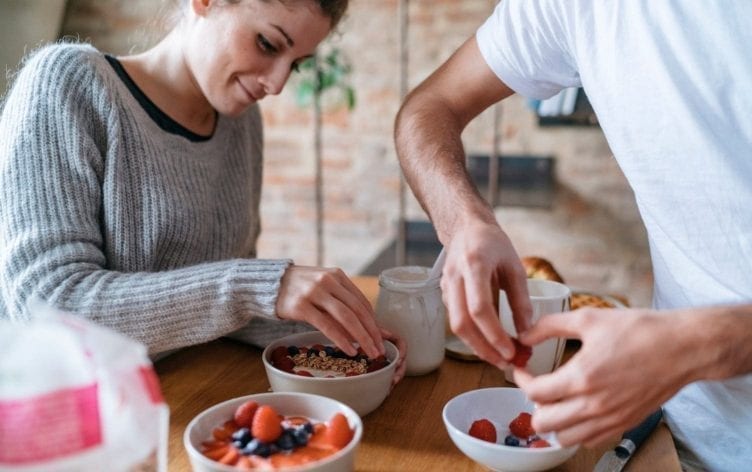
When it comes to losing weight, it’s not just the calories in the foods you eat that could help — or hinder — your efforts. Recent research found gut microbiota, the microorganisms such as bacteria, fungi and viruses living in your gastrointestinal tract, have an impact on weight loss.
Researchers recruited 26 overweight and obese adults to participate in a weight-loss program. During the three-month program, participants lost an average of 8.2 pounds, but those who lost at least 5% of their baseline weight — which researchers considered “successful” weight loss — had an increased abundance of the gut bacteria phascolarctobacterium compared to those who lost less than 5% of their starting weight.
In a second 2018 study, researchers at Johns Hopkins found an inflammation-regulating protein called Toll-like receptor 4 (TLR4) was lacking in mice with metabolic syndrome, a condition that causes significant weight gain and insulin resistance.
HOW BACTERIA AFFECT WEIGHT
“The bacteria are engines within the body that themselves depend on fuel in order for them to grow, and to survive they take their fuel from the food that we eat,” explains researcher David J. Hackam, MD, a professor of cell biology at Johns Hopkins University School of Medicine. “We have discovered that based on the genetic makeup of an individual (in this case a mouse, but this could also apply to a human), the bacteria are programmed in ways that make them more likely to consume more fuel for themselves, leaving less for the person in whose body they reside. As a result of there being less fuel available, [the person] is less likely to become obese.”
Other studies support this recent research. Among them, a study published in the journal Cell found those with “normal” BMI had different microbiota in their guts than those whose BMIs classified them as obese.
Cindy Davis, PhD, of the National Institutes of Health, has studied the connection between gut bacteria and weight loss, explaining it plays a role in everything from digestion to the production of hormones that regulate appetite, including leptin and ghrelin. Intestinal bacteria might also influence insulin sensitivity, causing your body to burn more (or less) fat.
Gut bacteria can also influence inflammation, according to Davis. “Some gut bacteria produce chemicals such as lipopolysaccharide, which causes inflammation and weight gain,” she explains.
DIET IS STILL IMPORTANT
While it would be easy to blame rogue gut bacteria for the number on the scale, Davis points out that diet plays a significant role in the micro-organisms making up the microbiome.
One landmark study found eating a high-fat “Western” diet for a single day had a significant effect on the gut microbiome; additional research showed that eating meat and dairy increased the abundance of a bacterium linked to inflammation, which could cause weight gain.
While genetics play a role in your gut bacteria, Davis notes that changing your diet can have a positive impact on the bacteria that call your gut home. “Just as there are foods to support the growth of beneficial bacteria, there are foods to minimize it,” she says.
FOOD TO FOCUS ON
Davis suggests eating fiber-rich foods like whole grains, fruits and vegetables, nuts and seeds that stimulate the growth of healthy gut bacteria. Dark chocolate, green tea and red wine, which contain complex chemical compounds called polyphenols, are also associated with the growth of beneficial bacteria.
Prebiotics and probiotics are also important. Prebiotics, a type of fiber that causes good gut bacteria to flourish, are found in foods like bananas, leeks and garlic. Fermented foods like yogurt and kefir contain probiotics, the live microorganisms that improve the abundance of good bacteria. Research found using probiotics to influence gut microbiota helped with weight loss, improved fat metabolism, improved insulin sensitivity and reduced chronic inflammation.
Steer clear of sugary foods that trigger an abundance of harmful gut bacteria that contribute to weight gain, Davis says.
THE BOTTOM LINE
Eating a diversity of nutritious foods can help promote the growth of healthy gut bacteria that could make it easier to lose weight. Hackam adds, “That said, each of us vary based on how much we gain or lose weight after a certain meal, and the current study shows that our own genetic makeup, including the amount of TLR4 we have in our body, can play a role through effects on the bacteria that live within us.”
